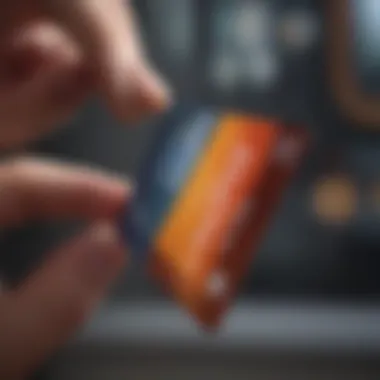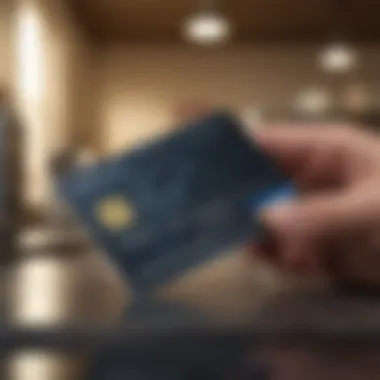Understanding the Discover Card Grace Period: Key Insights


Intro
The grace period is a crucial component of credit card usage, particularly for products like the Discover Card. It represents the timeframe during which cardholders can pay off their balance without incurring interest charges. Understanding this concept is essential for effective financial management. This article delves deeply into the Discover Card grace period, revealing its conditions, benefits, and implications for both novice and experienced users.
Market Overview
Current Market Trends
The landscape of credit cards is continuously evolving. Many users are becoming more aware of terms like the grace period and its importance. As more consumers seek to optimize their financial strategies, understanding grace periods is viewed as a key element to avoid unnecessary debt.
Key Market Indices Performance
While specific indices may not directly relate to credit cards, trends in consumer spending and economic behavior can offer insight into how credit products are utilized. A shift towards more responsible credit usage may be observed in response to financial education resources and improving economic conditions.
Economic Factors Influencing the Market
Several economic factors play a role in how credit cards function today. Interest rates, inflation, and consumer confidence directly influence credit card usage. For instance, higher interest rates may push consumers to pay off their balances more diligently to avoid accruing excessive interest charges.
Sector Spotlight: Leading Sectors Affected by Trend
The financial services sector, particularly credit card issuers, remains at the forefront of this trend. As consumers become more informed, issuers are adapting their products to meet these demands. Features such as improved mobile apps and enhanced customer service reflect this shift.
Grace Period Mechanics
Understanding how the grace period operates is fundamental for optimizing credit usage. Generally, the grace period starts at the end of the billing cycle and ends when the payment is due. However, certain conditions apply to maintain it.
Conditions Governing the Grace Period
To qualify for the grace period, users typically need to pay their previous balance in full by the due date. If a balance is carried over, interest will begin to accrue. This concept underscores the importance of planning payments accordingly.
Maximizing Benefits of the Grace Period
Effectively utilizing the grace period can lead to significant savings on interest. To maximize this benefit, cardholders should:
- Pay off the full balance each month.
- Set reminders for payment due dates.
- Monitor statements for any discrepancies.
Ending
The Discover Card grace period plays a vital role in consumer financial management. By understanding its significance and the conditions that govern it, individuals can make informed credit decisions. This knowledge not only enhances personal finance skills but also empowers users to navigate the complexities of credit card agreements more effectively.
Preamble to Credit Card Grace Periods
The grace period is a crucial concept in the realm of credit card usage. Understanding how this period operates can significantly influence one's financial decisions. This section elaborates on the mechanics of grace periods, emphasizing their role in effective credit card management.
Defining the Grace Period
A grace period is the time frame allowed for a credit card holder to pay their balance in full without incurring interest charges. It typically begins at the end of the billing cycle and lasts until the payment due date. Understanding this specific timeframe is essential for cardholders to manage their finances wisely.
The general rule is that if the previous month's balance is paid in full, new purchases will not generate interest during the grace period. However, if the balance is not paid completely, interest can accrue on the remaining balance and any new purchases.


Importance of the Grace Period in Credit Cards
The grace period offers several benefits to cardholders. First, it can help in managing cash flow by providing additional time before payments are due. This is useful for individuals who may have fluctuating income or unexpected expenses.
Additionally, the grace period serves as a way to avoid unnecessary interest charges. When cardholders understand how to utilize this period effectively, they can maintain a healthier financial outlook.
Here are some key points regarding its importance:
- Financial Flexibility: Cardholders can manage expenses more effectively without immediately worrying about interest accrual.
- Cost Savings: Paying off the balance during this window can save significant amounts in interest payments over time.
- Good Credit Practices: Using the grace period responsibly can enhance credit scores, reflecting responsible borrowing behavior.
Overview of Discover Card
The Discover Card represents a multifaceted financial tool within the credit industry. Understanding its nuances is vital for anyone looking to optimize their credit card experience. Discover Card offers unique features and benefits that set it apart from its competitors. This section will delve into the specific attributes and the variety of card types available, offering essential insights for both novice and experienced users.
Features of Discover Card
Discover Card is well-known for its customer-centric attributes. Some key features include:
- Cashback Rewards: Discover provides various cashback options. Users can earn a percentage on everyday purchases, including groceries and restaurants. This incentivizes responsible credit use.
- No Annual Fee: Unlike many other credit cards, Discover typically waives annual fees. This is beneficial for consumers, particularly those just starting with credit.
- FICO Credit Score Monitoring: Cardholders can access their FICO score without any cost. Monitoring credit scores is crucial for managing finances and ensuring timely payments.
- Wide Acceptance: Discover is not as common globally as Visa or Mastercard, but domestically it is widely accepted. This allows flexibility in usage for American consumers.
- Customer Service: Discover boasts robust customer support. Users can reach out for assistance or disputes, which promotes trust and reliability.
These features underscore Discover's commitment to making credit accessible and beneficial, aligning well with user interests in financial management.
Types of Discover Cards Available
Discover offers a variety of card options tailored to different spending habits and financial needs. Understanding these types helps consumers choose the one that fits them best. The main categories include:
- Discover it® Cash Back: This card provides 5% cashback in rotating categories, making it ideal for users who can maximize their rewards by enrolling in specific offers.
- Discover it® Miles: Rather than rewards for shopping, this card offers travel miles for every dollar spent. It is suitable for frequent travelers.
- Discover it® Student Cash Back: Specifically intended for students, this card helps young adults build credit history. It offers cashback rewards with no annual fee.
- Discover it® Secured Card: Aimed at individuals rebuilding credit, this secured card requires a cash deposit but encourages responsible spending and repayment behavior.
By offering diverse options, Discover makes it simpler for individuals to navigate their credit card choices wisely, tailoring their selection based on personal financial goals and spending patterns.
Mechanics of the Discover Card Grace Period
Understanding how the grace period functions is essential for anyone using a Discover Card. The grace period is that time frame when a cardholder can pay off their balance without incurring interest on new purchases. Knowing the mechanics of this period can help users make more informed financial decisions and enhance their overall credit card experience. The following sections will detail how the grace period operates, its duration, and the significance of payment due dates.
How the Grace Period Works
The grace period begins at the end of a billing cycle. When a cardholder makes a purchase during this time, they are not immediately charged interest. Instead, the grace period allows users to pay off their balance before interest accumulates. However, it is important to note that to benefit from this feature, the previous balance must have been paid in full by the due date. Not all transactions are treated equally. For instance, if a user carries a balance from one month to another, they may lose the grace period on new purchases.
It is also crucial to remember that the grace period applies only to purchases, not cash advances or balance transfers. This differentiation is key for effective financial management. Therefore, timing purchases within the billing cycle can maximize the grace period’s benefits.
Length of the Grace Period
Typically, Discover Cards offer a grace period that lasts 21 to 25 days. This timeframe can vary slightly depending on the cardholder's specific terms and billing cycles. Knowing the exact length of the grace period helps cardholders plan their payments accordingly. A longer grace period provides additional time to make payments without incurring interest.
This duration is especially beneficial if cardholders anticipate fluctuations in their cash flow. Failing to stay aware of these timelines can result in unnecessary interest charges. Therefore, being proactive about understanding the specific grace period duration for their card is a prudent step for consumers.
Payment Due Dates and Their Importance
Payment due dates play a critical role in maintaining the grace period. Each billing cycle ends on a certain date, resulting in a due date for payments. Making payments on or before this due date is imperatively related to keeping the grace period intact. If a minimum payment is made late or not paid at all, it may disrupt the grace period.


Additionally, cardholders should also keep in mind that payments need to account for the whole statement balance to continue enjoying the grace period benefits. It's beneficial to set reminders or automate payments to ensure timely payments, thus preserving the ability to utilize the grace period effectively.
To maximize financial outcomes, always be aware of your payment due dates and plan payments by the end of the grace period.
By grasping these fundamental mechanics, cardholders can leverage the Discover Card grace period more effectively, leading to better financial management and potentially improved credit scores.
Conditions for Maintaining the Grace Period
The grace period is a critical feature of credit cards, particularly for those using the Discover Card. Understanding the conditions that maintain this period can lead to significant financial advantages. At its core, the grace period allows cardholders time without incurring interest on their purchases, provided certain conditions are met. Here’s a closer examination of these elements.
Making Payments on Time
Timely payments are essential for maintaining the grace period. When cardholders pay their balances in full by the due date, they prevent interest from accruing on new purchases made during the billing cycle. It's important to note that missing a payment can trigger interest immediately, even if the grace period was previously in place. Cardholders must track their payment schedules. Myocardial infarction can occur due to a forgotten due date or a misunderstanding of the payment cycle. Setting reminders may help prevent oversight.
- Ensure payment is made by the due date.
- Consider setting up automatic payments to avoid late fees.
- Regularly check account statements to keep track of the owed amounts.
Understanding Charges That Affect the Grace Period
Not all charges qualify under the grace period. Some transactions specifically can interrupt this benefit. For instance, cash advances and balance transfers usually do not have a grace period attached. They may start accruing interest from the moment they are posted to the account. Additionally, annual fees or other service charges can also impact the grace period. Being vigilant about these charges ensures cardholders maintain their financial advantage.
Key Takeaway: Maintaining the grace period requires understanding which transactions affect it. Awareness means smart financial management.
- Review account terms for specific charge types.
- Differentiate between regular purchases and cash advances.
- Know the timing of when transactions are posted.
In summary, maintaining the grace period with the Discover Card depends on timely payments and an understanding of various charges. These conditions are not just recommendations; they’re fundamental rules that govern the financial benefits of using this credit card. It is crucial for cardholders to be informed and engaged with their credit terms to avoid unnecessary expenses.
Benefits of Utilizing the Grace Period Effectively
Understanding how to utilize the grace period associated with the Discover Card can lead to significant financial advantages. The grace period refers to the time frame where cardholders can pay off their balances without incurring interest charges. Understanding this feature enables consumers to manage their finances better and improve their overall credit health.
Avoiding Interest Charges
One of the primary benefits of using the grace period effectively is the ability to avoid interest charges on purchases. If payments are made in full before the due date, no interest accrues during the grace period. Here are key considerations:
- Timely Payments: Always pay your balance on time. Late payments can lead to losing the grace period, resulting in more costs over time.
- Full Payments: Making full payments before the end of the grace period is crucial. If you only make partial payments, interest will still apply on the remaining balance.
- Monitoring Purchases: Regularly track your expenses, ensuring you know what you owe. This practice can help you plan payments effectively and stay ahead.
By doing these actions, you can prevent unnecessary expenses. Making the most of this grace period can result in substantial savings over time.
"Using your grace period wisely means you are taking charge of your finances, ultimately leading to more savings."
Enhancing Credit Score Management
Utilizing the grace period can also positively influence your credit score. Many factors contribute to credit scores, and how you handle your credit card accounts plays a significant role. Here are some points to keep in mind:
- Payment History: Consistent on-time payments are crucial for a strong credit score. Using the grace period effectively ensures on-time payments, boosting your payment history.
- Credit Utilization Ratio: Keeping your balance low relative to your credit limit, especially by paying off your balance before interest accrues, supports a healthy credit utilization ratio. A lower ratio reflects positively on your score.
- Responsible Credit Management: By understanding and using the grace period, you demonstrate responsible credit management. Lenders take note of this when assessing creditworthiness.
Common Misconceptions About the Grace Period
Beliefs About Automatic Grace Periods


One prevalent belief is that the grace period is always automatic for every transaction made with a Discover Card. While it is true that most credit cards, including Discover, offer a grace period, this is not a blanket rule for all charges. The grace period generally applies when the cardholder pays their balance in full by the due date. If a customer carries a balance from a previous billing cycle, new purchases may incur immediate interest, nullifying the grace period. This misconception can lead to unexpected expenses if individuals assume that they are free from interest charges without clarifying their account status.
It is also essential to understand that certain transactions, such as cash advances or balance transfers, most often do not qualify for the grace period. Customers should always review the terms associated with these transactions to understand their impact on interest rates and repayment schedules.
Assumptions Regarding Grace Periods and Payments
Another common assumption is that making a payment on the due date guarantees the avoidance of interest. However, this is only accurate if the payment amount equals the full balance. Partial payments will not suffice to maintain the grace period. Therefore, many customers fall into the trap of thinking that their last-minute payments are adequate, only to be surprised by interest charges later. Timing in these payments should be carefully considered, ideally well ahead of the deadline.
Furthermore, some individuals may mistakenly believe that they can shift payments from one month to another without repercussions. Each month is treated independently regarding interest calculations, and rolling over payments may accumulate more debt. Consistent habits in managing payment schedules are critical for effectively utilizing the grace period.
The disappointment of unexpected interest charges often stems from misunderstandings about the mechanics of the grace period.
To mitigate these issues, cardholders should familiarize themselves with the terms of their Discover Card agreement. Staying informed about payment requirements and the scope of the grace period will significantly improve financial management strategies, allowing users to benefit optimally from their credit card usage.
Comparative Analysis with Other Credit Cards
Understanding how Discover Card's grace period compares to those of other credit cards is crucial for consumers. This analysis surfaces key details in grace period policies and clarifies consumer preferences that can lead to more informed credit decisions.
Grace Period Policies of Major Competitors
Many credit card companies have varying policies regarding grace periods. For example, Visa and Mastercard often offer similar grace periods of 21 to 25 days, depending on the issuing bank. American Express tends to provide no grace period on certain charge cards, requiring users to settle the balance each month.
- Visa: Generally offers a grace period of 21 to 25 days based on the issuer's rules.
- Mastercard: Similar to Visa, but some issuers may have additional conditions attached.
- American Express: Often has no grace period for charge cards while offering grace periods for its credit cards.
- Capital One: Usually offers a standard grace period, but the specifics can depend on the card type.
With different policies in place, consumers should consider how these grace periods align with their payment habits. For instances when spending leads to unexpected balances, knowing which card can provide more time can be beneficial.
Consumer Preferences Based on Grace Periods
Consumer preferences largely hinge on how grace periods affect overall costs. Many consumers favor cards that allow them to avoid interest charges by making timely payments. The flexibility provided by a grace period can influence the choice of credit card.
- Common Trends: Many users are inclined to select cards with longer grace periods to enable planning around cash flows.
- Interest Awareness: Consumers often express a desire for greater transparency regarding how grace periods function, especially concerning when interest actually begins to accrue.
- Usage Patterns: Users who may carry a balance from time to time often prefer credit cards with lenient grace periods, seeing them as a means to manage their finances better.
Culmination
The grace period is a vital aspect of credit card management, specifically when discussing the Discover Card. Its significance extends beyond the mere notion of providing additional time for payments. The grace period represents a strategic element in financial literacy, influencing how consumers approach budgeting and debt management.
The Role of the Grace Period in Financial Literacy
Understanding the grace period equips consumers with the knowledge to make informed decisions regarding their credit usage. It encourages a mindful approach towards expenditures and payments. When consumers comprehend how and when the grace period applies, they can strategically defer payment, thus avoiding interest charges altogether.
Key areas to consider include:
- Management of cash flow: By utilizing the grace period effectively, users can align their payment schedules with their income cycles, which can prove beneficial in times of financial constraint.
- Improved budgeting practices: Knowing when charges will incur can help in planning and reallocating funds as necessary. This allows individuals to stay financially stable and on track.
- Enhancing credit health: Regularly paying bills on time, including those within the grace period, positively affects credit scores, fostering a good credit history.
"Being aware of the grace period transforms credit card use from a mere transaction into a strategy for financial wellbeing."
Final Thoughts on Maximizing Financial Outcomes
To maximize benefits derived from the grace period, one must remain vigilant about their spending habits and payment schedules. Effective financial management using the grace period can lead to significant savings in interest over time. Also, being aware of the specific rules and requirements set by Discover is crucial.
Recommendations for enhancing your experience include:
- Regular review of statements: Understanding your spending and possible charges influences better management. Frequent checks can prevent oversight.
- Setting reminders for payment due dates: Lifestyle changes can lead to missed payments. Utilize technology to stay organized with notifications.
- Educating oneself about terms and conditions: Each credit product may have unique features concerning the grace period. Familiarity with these details results in better personal finance management.
Ultimately, the grace period serves as an advantageous feature of the Discover Card, promoting responsible credit behavior and financial literacy. Integrating these insights into your daily financial routine can lead to more informed choices and better economic outcomes.







